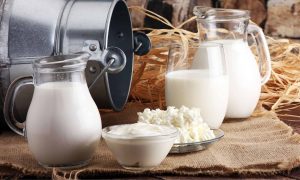
Functional foods are those that, in addition to their usual nutritional conditions, provide relevant extra benefits in terms of well-being or disease prevention. They look, smell and taste just like their traditional counterparts.
The development of functional dairy products is a global trend because we are increasingly interested in the way we eat and the quality of life. Dairy products have all the qualities to be functional foods, since it is very easy to add ingredients such as probiotics and prebiotics, vitamins and minerals, proteins and bioactive peptides, fiber, antioxidants and unsaturated fatty acids to the elements that already compose them.
The consumption of milk and its derivatives in itself contributes to the improvement of different conditions such as cardiovascular diseases, diabetes and intestinal disorders, and to the modulation of the intestinal microbiota from probiotic strains and by the insulin-tropic and immunomodulatory properties of the bioactive proteins and peptides they contain.
The design and development of functional dairy products has focused on the addition of new bioactive compounds different from the traditional ones (probiotics and prebiotics), incorporating antioxidants, unsaturated fatty acids, fiber and micronutrients, and their health benefits revolve around the regulation of metabolic processes, The health benefits revolve around the regulation of metabolic processes, appetite and satiety, intestinal microbiota balance, modulation of oxidative stress, inflammatory and immune response, reduced risk of developing diseases and improved mental, cognitive, physical and athletic performance, among others.
Milk and its derivatives with their high biological value proteins and minerals such as calcium, their wide sensory acceptability and their versatility to become vehicles of bioactive molecules, allow the food industry to develop high quality products by adding, reducing, eliminating and substituting different compounds and nutrients.
A wide variety of functional dairy products are available on the market, such as milk fortified with vitamins, conjugated linoleic acid and omega-3; yogurts and milk drinks enriched with probiotics, prebiotics and added with fiber. I even visited a cheese factory a few days ago, which manufactures them exclusively under this concept of added health value, which I will surely tell you more about later.
Milk is a complex substance, containing lactose, protein, lipids, mineral salts and vitamins. It is considered one of the most important sources of protein in the human diet since a 200 ml glass provides approximately 6.4 g of protein. Essential amino acids make up 26% of its proteins, with a bioavailability of over 90%.
The soluble fraction of its proteins represents 20% of the total content and is present in the serum, composed of amino acids that contribute to increased satiety. The insoluble fraction represents 80% and is what we know as casein.
Milk lipids vary according to the characteristics of the cows that produce it, but it contains approximately 98% triglycerides, 2% diglycerides and a fraction of less than 0.5% composed of cholesterol, free fatty acids, fat-soluble vitamins and beta-carotene.
On average, 70% of milk fatty acids are saturated and the remaining 30% are unsaturated fatty acids. About 25% of the fatty acids in milk are monounsaturated, and 2.3% are polyunsaturated.
The main carbohydrate present in milk is lactose, a disaccharide that can be used as a substrate in the process of obtaining fermented products.
Another compound present in milk with great influence on health are oligosaccharides, which act as prebiotics on the intestinal microbiota, allowing its growth and protecting the intestinal lumen from the adhesion of infectious agents that can cause diseases.
Among the minerals present in milk, we find calcium in an average of 240 mg per 200 ml serving, with a bioavailability of up to 75%. In addition to calcium, milk also has a high phosphorus content, providing approximately 190 mg per 200 ml of milk, and is found in organic form bound to proteins, phospholipids, organic acids and nucleotides, mainly in micelles, and in inorganic form. It also contains other minerals such as magnesium, zinc and selenium.
The content of fat-soluble vitamins (A, D, E) varies depending on different factors such as environmental factors, the breed of the cows, their feed, and the skimming of the milk, determined by the final fat concentration. It is considered that milk with its full fat is a source of vitamin A, therefore products that are reduced in fat should be fortified. Its action is anticarcinogenic, cardioprotective and collaborates in the absorption of calcium.
On the other hand, the B complex vitamins and vitamin C available in milk are important enzymatic cofactors involved in energy production, neurotransmitters and hormone synthesis, providing riboflavin at 35.9% of the recommended daily value and cobalamin up to 61%.
Milk consumption is related to the prevention of different diseases, in weight reduction, in the amount of visceral fat tissue and the decrease in the incidence of diabetes mellitus type 2.
The Ca, Mg and potassium (K) contained in milk are antihypertensive, playing an important role in the prevention of arterial hypertension, together with the bioactive peptides produced after its digestion.
Milk consumption increases bone density, due to its calcium and phosphorus content that allow bone mineralization, helping to prevent the development of osteoporosis, in addition to allowing adequate bone formation during the growth period in childhood, and also
On the other hand, different authors found that the daily consumption of a yogurt with probiotics promotes immune function.
As a consequence of this consumer interest in a diet with extra benefits, in recent years, its demand and production has increased. The increase in the supply of functional dairy foods on the market has a double impact, on the one hand on public health through increased consumption of health-promoting products and on the other hand strengthening the dairy industry.
What is your favorite functional dairy? I’m going to choose a milk with extra protein for breakfast, because my Fridays are very active and I need extra healthy strength to be able to handle everything and also exercise!
Have you had your glass of milk today?
Valeria Guzman Hamann
EDAIRYNEWS























